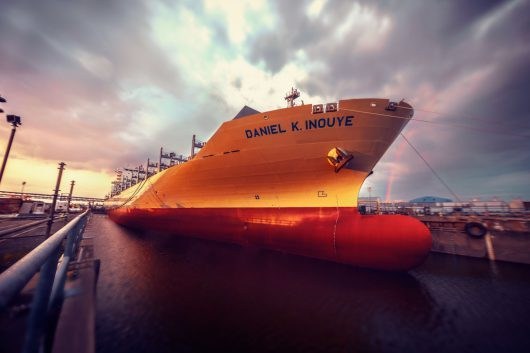When class society DNV GL labelled LNG as the fuel of the future, some eight years ago, the group became tied to the phrase. Today, DNV GL and others remain confident that LNG will prove to be a transitional fuel to achieve emission targets.
That was a view that informed the delegates’ discussions as the International Maritime Organization (IMO) met in mid-November discussing, among other things, the transitional period from fossil fuels to zero emission vessels. It is interesting to note that one of the world’s leading ship operators was also discussing the issue.
Søren Skou, CEO at Maersk was fielding questions from financiers online when he was asked about capital investment and the plans for Maersk Line to invest in new ships. Skou’s answer was illuminating and maybe a little disappointing for those in the industry pushing LNG as a transitional fuel.
Skou pointed out that the technical risks to the transition were “not trivial” and that finding a solution for decarbonisation makes ordering vessels a far more complex issue than it already was. “We will need to order ships to be delivered two years later to last 25 years,” said Skou, adding, “It is a risk when you don’t know what fuels you’ll be using in 2030.”
In conclusion Skou said, “I don’t believe that LNG will play a major role for us as a transition fuel, we’d rather go from what we do today straight to a carbon neutral type of fuel.”
Both Matson and CMA CGM have opted to use LNG fuel, while German carrier Hapag-Lloyd has opted to trial the fuel with a former UASC, LNG-ready, vessel, but there seem few takers for the liquified gas. And Maersk’s alliance partner, MSC has also opted for LNG as a transitional fuel, it announced last month. As an interim option, however, using LNG as a fuel risks future regulation that could potentially make the vessels costly to operate, or worse render them stranded assets as the drive to decarbonise intensifies.
One financier, who spoke to Container News on the guarantee of anonymity, believes that the mantra, Environmental, Social, and Governance (ESG), currently fashionable within investor circles is being increasingly applied to investors’ analysis when identifying material risks and growth opportunities.
It may be the reasoning behind Skou and Maersk’s reluctance to invest in LNG vessels, though the Danish carrier said it would be ordering vessels in the 10,000-15,000TEU range as these ships were older, and they were not “cost-effective to charter”.
Given the costs of making a strategic error when ordering vessels has substantially increased as the environmental concerns have risen up the priority ladder, it may be that Maersk will delay any major investment in new tonnage for some time.
As Skou, himself, acknowledges developing new fuels take some years. But with the industry intention to achieve a 30% cut in emissions by 2030 the vessel ordering window is an ever-tightening noose. Investing under these circumstances is a tough proposition. Yet it is for this reason that the rewards, for those that make the right decision remain substantial.
Fortunately, we do not have to wait too long to see whether Maersk or their competitors opted for the fuel of the future.
Nick Savvides
Managing Editor







